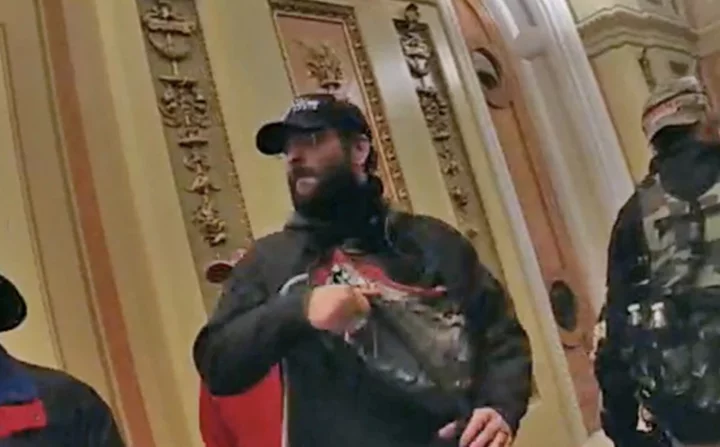
Jan 6 fugitive arrested near Obama’s home with guns and ammunition
A January 6 fugitive had two guns and 400 rounds of ammunition in his van when he was arrested close to the home of former President Barack Obama this week, federal authorities said. Taylor Taranto, 37, was arrested on Thursday outside the Obamas’ Washington DC home hours after he shared a social media post from former president Donald Trump which revealed his predecessor’s address. Taranto was arrested on charges stemming from his activities during the Capitol riot two years ago. Law enforcement also discovered materials for a Molotov cocktail in his vehicle. The matter is being reviewed by the FBI’s Joint Terrorism Task Force. Mr Taranto was detained by the Washington DC Metropolitan Police Department and federal law enforcement, and charged with being a fugitive from justice. “Arresting officers requested MPD’s Explosive Ordnance Disposal (EOD) Team to perform a vehicle sweep of the individual’s van near the location of the arrest,” MPD said in a statement, according to CNN. “There is no active threat to the community and this incident remains under investigation.” Mr Taranto reposted a Truth Social post by Mr Trump which included an article containing the address of the Obamas as well as a number of other Democrats. Mr Taranto added his own comment: “Got them surrounded!” The 2017 article shared by Mr Trump was a piece in The Phyllis Schlafly Report, named after the conservative activist who passed away in 2016. It included the home address of the Obamas. In a live stream, Mr Taranto told his audience that he also had a “detonator,” according to Mediaite. The shocking scene played out in the wealthy neighbourhood of Kalorama on Thursday. Mr Taranto was chased by police and Secret Service while he ran towards the home of the Obamas and warned authorities that he had an explosive device. CBS News reported that he fled after being spotted by Secret Service, who had apparently been alerted to his intentions after Mr Taranto made “threats during recent live streams on social media”. Mr Taranto had an active arrest warrant related to the attack on the Capitol when he was captured near the former president’s home, according to CBS. DC police confirmed to The Independent that Mr Taranto had been charged with being a fugitive from justice pursuant to another arrest warrant and that officers had conducted an explosives sweep of his vehicle. “This afternoon, MPD and our federal law enforcement partners arrested 37-year-old Taylor Taranto, of no fixed address, in the 2400 block of Kalorama Road, Northwest. He has been charged with Fugitive from Justice, pursuant to an arrest warrant. Arresting officers requested MPD’s Explosive Ordnance Disposal (EOD) Team to perform a vehicle sweep of the individual’s van near the location of the arrest. There is no active threat to the community and this incident remains under investigation,” wrote an MPD spokesperson. It wasn’t immediately clear if Mr Obama or any members of his family were home at the time of the incident. The former president was in DC earlier this week for lunch with his former VP, incumbent President Joe Biden, as the latter begins the long work of running for re-election. Read More Biden's Iran envoy placed on unpaid leave pending a review of his handling of classified documents Gun advocates challenge Biden administration rules on handgun braces at appeals court Biden is wrapping a campaign fundraising blitz aimed at making a bold early statement
2023-07-01 21:29

Jan 6 fugitive shared Trump post sharing Obama’s home address before arrest with guns and ammunition
A January 6 fugitive had two guns and 400 rounds of ammunition in his van when he was arrested close to the home of former President Barack Obama this week, federal authorities said. Taylor Taranto, 37, was arrested on Thursday outside the Obamas’ Washington DC home hours after he shared a social media post from former president Donald Trump which revealed his predecessor’s address. Taranto was arrested on charges stemming from his activities during the Capitol riot two years ago. Law enforcement also discovered materials for a Molotov cocktail in his vehicle. The matter is being reviewed by the FBI’s Joint Terrorism Task Force. Mr Taranto was detained by the Washington DC Metropolitan Police Department and federal law enforcement, and charged with being a fugitive from justice. “Arresting officers requested MPD’s Explosive Ordnance Disposal (EOD) Team to perform a vehicle sweep of the individual’s van near the location of the arrest,” MPD said in a statement, according to CNN. “There is no active threat to the community and this incident remains under investigation.” Mr Taranto reposted a Truth Social post by Mr Trump which included an article containing the address of the Obamas as well as a number of other Democrats. Mr Taranto added his own comment: “Got them surrounded!” The 2017 article shared by Mr Trump was a piece in The Phyllis Schlafly Report, named after the conservative activist who passed away in 2016. It included the home address of the Obamas. In a live stream, Mr Taranto told his audience that he also had a “detonator,” according to Mediaite. The shocking scene played out in the wealthy neighbourhood of Kalorama on Thursday. Mr Taranto was chased by police and Secret Service while he ran towards the home of the Obamas and warned authorities that he had an explosive device. CBS News reported that he fled after being spotted by Secret Service, who had apparently been alerted to his intentions after Mr Taranto made “threats during recent live streams on social media”. Mr Taranto had an active arrest warrant related to the attack on the Capitol when he was captured near the former president’s home, according to CBS. DC police confirmed to The Independent that Mr Taranto had been charged with being a fugitive from justice pursuant to another arrest warrant and that officers had conducted an explosives sweep of his vehicle. “This afternoon, MPD and our federal law enforcement partners arrested 37-year-old Taylor Taranto, of no fixed address, in the 2400 block of Kalorama Road, Northwest. He has been charged with Fugitive from Justice, pursuant to an arrest warrant. Arresting officers requested MPD’s Explosive Ordnance Disposal (EOD) Team to perform a vehicle sweep of the individual’s van near the location of the arrest. There is no active threat to the community and this incident remains under investigation,” wrote an MPD spokesperson. It wasn’t immediately clear if Mr Obama or any members of his family were home at the time of the incident. The former president was in DC earlier this week for lunch with his former VP, incumbent President Joe Biden, as the latter begins the long work of running for re-election. Read More Biden's Iran envoy placed on unpaid leave pending a review of his handling of classified documents Gun advocates challenge Biden administration rules on handgun braces at appeals court Biden is wrapping a campaign fundraising blitz aimed at making a bold early statement
2023-07-01 20:46
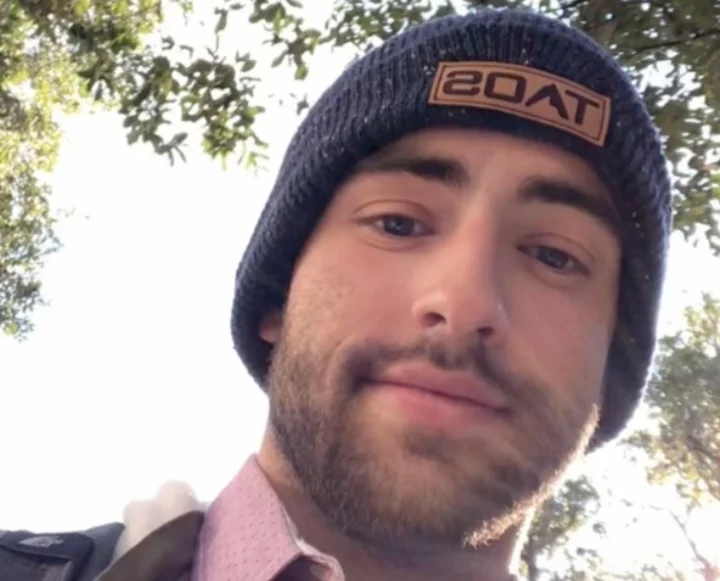
Austin Salyer was fatally shot through his apartment wall. The shooter is only serving 90 days in jail
Austin Salyer was lying in bed when he was fatally struck by a bullet his neighbour accidentally fired through the wall that separated their apartments. The criminal justice and military science student at Texas State University had gone to bed early on the night of 16 September 2021 because he had an early ROTC training the next morning. The pain his parents, Rodney and Bonnie Salyer, experienced as they went through the living hell of losing their only son is still very much present two years later. But they tell The Independent they’re committed to telling Austin’s story in hopes that it leads to much-delayed justice for their son. “He had just gone to basic camp at Fort Knox and he absolutely loved that. He was looking forward to the following summer when he would go to his advanced camp,” Mr Salyer says. “He was doing everything well, just everything that would make a parent proud.” Austin’s killer, 24-year-old Gabriel Brown, was convicted of criminally negligent homicide. However, the 180-day jail sentence Brown was given and the judge’s choice to then reduce it to just 90 days have left the Salyers in a seemingly endless search for answers. The judge’s and Hays County prosecutors’ refusal to explain that sentencing has only exacerbated their frustration. Following a court process they say was marked by disregard for Austin’s loved ones, the grieving parents believe their son was failed by the very system that he dreamed of serving. They are now determined to obtain some semblance of justice for Austin’s memory. “September will be two years, so we’ve had some time to grieve, some time to adjust,” Mr Salyer says. “We still grieve every day. It’s not as raw as it used to be, there’s kind of a scab from there, but it still hurts every day. There are triggers every day.” The shooting Brown told authorities that his gun misfired while he was modifying it with a micro-conversion kit and speaking on the phone with his father. According to the Salyers, he called Austin on Snapchat and tried to knock on his door but then went back to his apartment without getting any answer. The bullet he fired ripped through Austin’s left arm and travelled through both his lungs before it lodged in his right arm. It is unclear how long Austin was alive after he was shot, but he managed to at least get out of bed and make it to the living room of his apartment. “It’s just beyond our imagination how you could literally shoot a bullet through a crowded apartment wall, not get a response from the person that you know is living next door and then not do anything else. Just go to sleep,” Mr Salyer says. Austin’s body wasn’t found until the next morning, when his mother asked friends to check in on him after he failed to answer her calls and she became worried he had overslept. The Texas State student was supposed to wake up at 4.30am for his first road march with his Army platoon. “This is literally almost 12 hours later. [Brown] still had not called for help. He still had not gotten even something like the apartments to go check on him,” Mr Salyer adds. “Nothing. Nothing at this point.” Sentencing change Hays County prosecutors working on the case and Brown’s attorney reached a plea deal that resulted in the initial 180-day sentence. The Salyers hadn’t agreed with the charges of negligent homicide or the decision to skip a trial, but they came to terms with the results the system had delivered, they said. “Criminally negligent homicide would be an open and closed case,” Mr Salyer said. “And [they] would have to put more effort into proving manslaughter ... We don’t get to know everything in this situation, but it does feel like either they lack the passion, they’re overwhelmed, or whatever other motives they may have.” Confusion then emerged during Brown’s sentencing. According to a transcript the Salyers obtained from the court, the judge first sentenced Mr Brown to serve a total of 18 days in prison every year - nine of them for Austin’s birthday, and nine others for the anniversary of his death. But with a five-year probation, that only equalled a 90-day sentence. The judge then corrected herself, noting that every separate sentence would be 18 days, bringing the total of days Brown would spend in jail to 36 every year, and 180 in the five years of probation. He was also given community service and was ordered to pay a small restitution to the Salyers. But court records show that at some point in the following days, the bi-yearly 18-day sentence was scratched out and changed to nine. “There was no other documentation. There was no initials. There was no indication of who made this change. Today, we still do not know who made this change,” Mr Salyer tells The Independent. A later amendment indicated the change was made by the judge, but did not explain the reasoning behind it. The Salyers allege they were not made aware of the change until they followed up in regard to Brown’s probation. District Attorney Kelly Higgins told Fox 7 that the case is not over and the judge is the only one who can “explain why she decided what she decided.” But when the Salyers requested a hearing with the judge to review the developments, they were told they can send her mail but can’t meet with her in person to discuss the changes. The defence attorney also filed a motion for “clarification for conditions of probations.” The Salyers say although they don’t fully understand what goes behind the scenes, court officials have never bothered to explain to them what exactly led up to the sudden sentencing change. “We’re not even allowed to talk to her. We’ve asked to speak to her so that we could get an explanation so that we could put our mind at ease and we were told she doesn’t,” Mr Salyer says. “We’re reasonable people ... If there’s a legitimate reason we could understand that.” Austin’s parents have now filed a civil lawsuit against Brown, his father and his girlfriend, who is believed to have been in his apartment around the time the shooting took place. They said that’s their last recourse to seek accountability. “And so that’s kind of the point we’re at now. It’s more about trying to understand why the justice system has failed Austin, why the justice system has failed us, why it’s failed his friends, and why it’s failed society as a whole,” Mr Salyer says. ‘It’s a life sentence for us’ When they were at the police station following Austin’s shooting, Mr Salyer says his wife asked about the shooter. “We’re thinking this is just a kid that just made a stupid mistake, this guy feels terrible,” he tells The Independent. “‘What condition must this guy be in?’ You know, to have killed somebody and seen this. And we’re thinking, ‘This must be really bad for him.’ So one of the first questions my wife asked the police was, ‘How is he?’” They said they have yet to see Brown extend the same courtesy to them, or even express remorse for taking their son’s life. In fact, when Ms Salyer took the stand as a witness during the plea deal hearing, Brown’s attorney reportedly asked her if she’d want Austin to serve “the maximum sentence” if the roles were reversed, a hypothetical that Ms Salyer found hurtful. “The only thing [Brown] said on the stand was, ‘If I could take that date back, I would.’ But that’s not saying I’m sorry,” Ms Salyer says. “It’s salt in the wound. To have somebody kill your son, your only son, your only child. And then from our perspective, not so much as even care.” “And to this day, again, we’re almost approaching two years. He has not once said, ‘I’m sorry.’ He has not once said, ‘Can you forgive me? There’s been no remorse,” Mr Salyer adds. “And that’s really what this story is about. We’re depending on the justice system to get accountability for his actions ... What little sentence he has is temporary. Ours is for the rest of our lives.” The Salyers want their son to be remembered for his heart of gold, for being the type of person who cried over commercials for animal charities, and for wanting to contribute to society in every way he could. “He would have done anything to help anybody. No matter who you were, no matter where you were from, no matter what your background was. He was there for everybody,” Ms Salyer says. Austins’ parents also regret that his body was found so long after he died. They believe had Brown called earlier, Austin, a registered organ donor, would have saved other people’s lives. “That was their magic moment to be able to get those organs from our son and it was just stripped away,” Mr Salyer says. Austin’s parents hope they can start a foundation in the future to continue their son’s legacy, but in the meantime, plenty of awards have been created in his honour. “Austin would have been commissioned as Second Lieutenant [this past May.] His ROTC actually invited us to that commissioning ceremony, where they honoured him,” Mr Salyer says, “[His high school created an award] called the Austin Salyer Teammate of the Year Award and the words that they’ve used to describe him are caring, helpful, selfless, noble, loyal, devoted, optimistic, enthusiastic.” From the home where they brought their son from the hospital after he was born, where they raised him and spent 18 years shaping him to be the great man he was on his way to becoming, Ms Salyer reads a letter from a friend of Austin who enlisted in the Army. After being stationed in Iraq, she asked the Salyers for one of Austin’s nametags, which she since has carried with her in every mission. “Mr and Ms Salyer ... Salyer’s flag was flown above Syria and Iraq for a total of 15.2 combat hours,” Ms Salyer reads from the letter. “Both Salyers and my flag were flown together on the Chinook ride I took back to Iraq, which was the only flight I did not take [while in] direct fire with enemy forces. I believe that was God and Sal. “Salyer’s patch has travelled to three locations in Syria and two locations in Iraq with me and has yet to ever leave my pocket. Thank you all for allowing me to carry him with me on my first deployment. He has kept me safe these last six months.” The Salyers say they have been embraced by a community of people whose lives were impacted by their son’s actions and character. With their help in continuing to share Austin’s legacy, the grieving parents have also learned to cope with the lingering pain. “It really honours us to have his memory carried on through his friends. It’s so special to us,” Ms Salyer says. Read More Ben Crump demands justice for Ajike Owens, the latest time he's supported a grieving Black family
2023-07-01 10:17

Trump sparks speculation by ranting about ‘charges against me’ in Georgia
Donald Trump set off speculation that he expects to be criminally charged in an election tampering probe in Georgia, ranting on social media about “all charges against me” in the high-profile case. That’s even though no such charges have been formally announced. On Friday, Mr Trump posted on Truth Social that Fulton County District Attorney Fani Willis will be “dropping all charges against me for lack of a case.” The former president has been under investigation in the Georgia county since February 2021, after he was recorded pressuring top Georgia officials to “find” him enough votes to win the 2020 election. In his post on Friday, Mr Trump defended the 2 January, 2021, call with Georgia Secretary of State Brad Raffensperger, as “perfectly legal” “I made a PERFECTLY LEGAL PHONE CALL, AS PRESIDENT OF THE UNITED STATES, ABOUT AN ELECTION THAT I STRONGLY FEEL WAS RIGGED AND STOLLEN,” Mr Trump wrote. “NONE of the MANY LAWYERS on the call minded my words, or even hinted at wrongdoing.” The comments made some speculate Mr Trump had already been charged in Fulton County, or had word he would be charged soon. “This makes me think that he, or his lawyers, were told something,” commentator Ron Filipkowski wrote on Twitter. “Maybe not, but this seems rather random for him to make this prediction today.” The Independent has contacted Donald Trump and the Fulton County District Attorney’s Office for comment. A charging decision in the Georgia investigation is expected soon. Ms Willis has signaled a decision could be announced in early August. Emily Kohrs, the foreperson of the grand jury considering evidence against Mr Trump, has hinted that he will be charged. “You’re not going to be shocked. It’s not rocket science,” Emily Kohrs told the New York Times in January, when the grand jury concluded its work. “You won’t be too surprised.” The speculation over Mr Trump’s fate comes as a former top Trump campaign official has agreed to potential testimony in the federal special counsel investigation into the former president’s alleged election meddling. Michael Roman, the 2020 Trump campaign’s director of Election Day operations, has reportedly reached a proffer agreement with the Justice Department, according to CNN. Read More Jan. 6 suspect arrested near Obama's Washington home had guns, machete in his van, feds say Fox reaches $12m settlement with former producer who sued company over ‘toxic’ workplace DeSantis hits back at Trump disloyalty claim: ‘Politicians have to earn support’ Gubernatorial nominee's plans to attend rally spark Republican infighting in Kentucky Jan. 6 suspect arrested near Obama's Washington home had guns, machete in his van, feds say Jill Biden hosts military chefs crowned 'Chopped' champs for guest stint in White House Navy Mess
2023-07-01 09:24
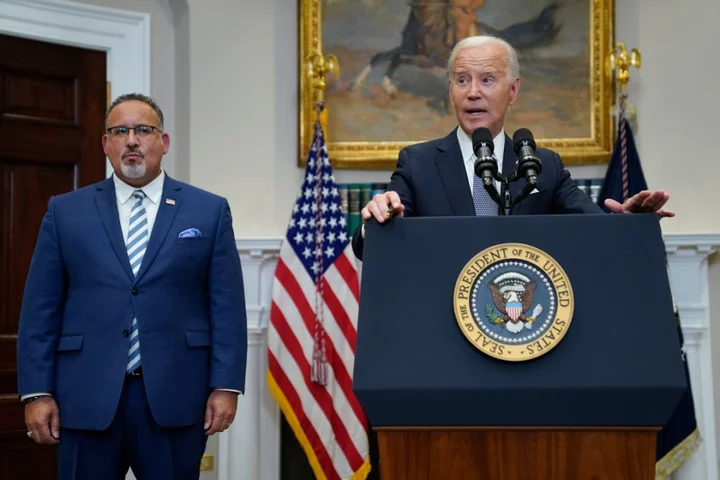
Biden reveals ‘new path’ to student debt relief after Supreme Court strikes down president’s plan
After the US Supreme Court struck down his administration’s plan to cancel federal student loan debts for millions of Americans, President Joe Biden has unveiled a “new path” for relief, one that he assured is “legally sound” but will “take longer”. In remarks from the White House on 30 June, the president hit out at Republican state officials and legislators who supported the lawsuit which enabled the nation’s highest court to strike down his student debt forgiveness initiative, accusing many of them of hypocrisy for taking money from pandemic-era relief programs while opposing relatively meager relief for student loan borrowers. “Some of the same elected Republicans, members of Congress who strongly opposed relief for students, got hundreds of thousands of dollars themselves ... several members of Congress got over a million dollars — all those loans are forgiven,” he said. “The hypocrisy is stunning,” he said. Accompanied by Secretary of Education Miguel Cardona, Mr Biden opened his remarks by acknowledging that there are likely “millions of Americans” who now “feel disappointed and discouraged or even a little bit angry about the court’s decision today on student debt”. “And I must admit, I do too,” he said. Still, Mr Biden reminded Americans that his administration has previously taken actions to reform student loan repayment programs to make them easier to access, and to keep borrowers from spending more than five per cent of disposable income on monthly repayments, and to strengthen loan forgiveness options for borrowers who take public service jobs. The president has directed Mr Cardona to “find a new way” to grant similar loan relief “as fast as we can” in a way that is “consistent” with the high court’s decision. On Friday, the Education Department issued the first step in the process of issuing new regulations under this so-called “negotiated rulemaking” process. In the mean time, Mr Biden said his administration is creating a temporary year-long “on-ramp repayment programme” under which conditions will remain largely the same as they have during the three-year pandemic-era pause in payments which is set to expire this fall. The department’s 12-month “on ramp” to begin repayments, from 1 October through 30 September, aims to prevent borrowers who miss repayments in that time period from delinquency, credit issues, default and referral to debt collection agencies. “During this period if you can pay your monthly bills you should, but if you cannot, if you miss payments, this on-ramp temporarily removes the threat of default,” he said. “Today’s decision closed one path. Now we’re going to pursue another — I’m never gonna stop fighting,” the president continued, adding that he will use “every tool” at his disposal to get Americans the student debt relief they need so they can “reach [their] dreams”. “It’s good for the economy. It’s good for the country. It’s gonna be good for you,” he said. Asked by reporters whether he’d given borrowers false hope by initiating the now-doomed forgiveness plan last year, Mr Biden angrily chided the GOP for having acted to take away the path to debt relief for millions. “I didn’t give any false hope. The question was whether or not I would do even more than was requested. What I did I felt was appropriate and was able to be done and would get done. I didn’t give borrowers false hope. But the Republicans snatched away the hope that they were given and it’s real, real hope,” he said. The Supreme Court’s 6-3 ruling from the conservative majority argues that the president does not have the authority to implement sweeping relief, and that Congress never authorised the administration to do so. Under the plan unveiled by the Biden administration last year, millions of people who took out federally backed student loans would be eligible for up to $20,000 in relief. Borrowers earning up to $125,000, or $250,000 for married couples, would be eligible for up to $10,000 of their federal student loans to be wiped out. Those borrowers would be eligible to receive up to $20,000 in relief if they received Pell grants. Roughly 43 million federal student loan borrowers would be eligible for that relief, including 20 million people who stand to have their debts cancelled completely, according to the White House. Lawyers for the Biden administration contended that he has the authority to broadly cancel student loan debt under the Higher Education Relief Opportunities for Students Act of 2003, which allows the secretary of education to waive or modify loan provisions following a national emergency – in this case, Covid-19. Since March 2020, with congressional passage of the Cares Act, monthly payments on student loan debt have been frozen with interest rates set at zero per cent. That pandemic-era moratorium, first enacted under Donald Trump and extended several times, was paused a final time late last year. Over the last decade, the student loan debt crisis has exploded to a balance of nearly $2 trillion, most of which is wrapped up in federal loans. The amount of debt taken out to support student loans for higher education costs has surged alongside growing tuition costs, increased private university enrollment, stagnant wages and GOP-led governments stripping investments in higher education and aid, putting the burden of college costs largely on students and their families. Read More Supreme Court strikes down Biden’s plan to cancel student loan debts Supreme Court strikes down affirmative action, banning colleges from factoring race in admissions Biden condemns Supreme Court striking down affirmative action: ‘This is not a normal court’ Justice Ketanji Brown Jackson delivers searing civil rights lesson in dissent to affirmative action ruling
2023-07-01 04:48

Angry onlookers shout ‘dog killer’ at George Santos as he arrives at court for fraud hearing in New York
Angry protesters called congressman George Santos a “dog killer” on Friday as the Republican made an appearance at a Long Island federal court house, his first hearing since pleading not guilty last month to a13-count indictment related to fraud and money laundering charges. The chants were in reference to an alleged scandal in which the representative allegedly made off with more than $3,000 raised in a fundraiser to save a disabled US Navy veteran’s service dog, one of the many alleged acts of deception Mr Santos made as he worked towards his spot in Congress. The first-term congressman has denied knowing about veteran Richard Osthoff or his dog, calling the allegations “fake.” As Mr Santos exited court, Mr Osthoff, who was in the crowd, yelled, “You killed Sapphire, George. You killed my dog.” Others in the crowd reportedly chanted, “Resign” and “Shame” as the Republican passed by. Mr Santos was in court for a status conference on the federal case against him, where he faces 13 different charges, including fraud, money laundering, and theft of public funds. Prosecutors charge the New York rep mislead supporters and donors into giving him money, which he allegedly used for personal expenses that funded a lavish lifestyle. They also claim he misleadingly obtained unemployment benefits and lied about his personal finances when campaigning for the House of Representatives. Mr Santos has admitted to lying about certain aspects of his background, and is accused of fabricating everything from his education background to his religion to his career success. In court, Mr Santos did not speak, but his lawyers claim he and the government have exhibited a “wonderful working relationship” so far. The defence also said the prosecution has given them 86,000 pages of evidence to go through. The next court date for Mr Santos is 7 September. Outside of the federal case against him, Rep Santos is also under investigation by the House Ethics Committee. Read More Santos reveals names of two $500,000 bond cosigners ahead of court-ordered release Aide fired by George Santos says he got his job after sending money to Republican's deputy Effort to expel Santos falters as Republicans vote to send measure to Ethics Committee Watch: George Santos returns to court after fraud and money laundering charges AP News Digest 3:05 a.m. Rep. George Santos set to appear federal court on fraud and money laundering charges
2023-07-01 02:25
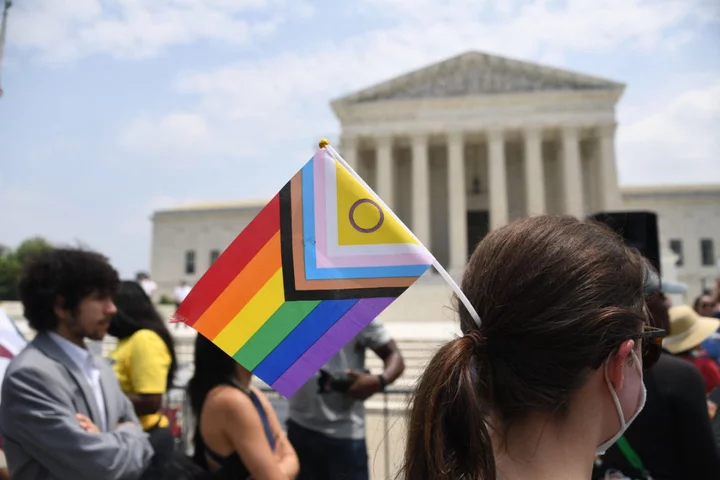
The ‘fake’ gay marriage case in the middle of the Supreme Court’s latest threat to LGBT+ rights
A Christian website designer in Colorado did not want to provide her services to same-sex couples, potentially running afoul of state law that prohibits public-facing businesses from discriminating against LGBT+ people. The designer didn’t have any same-sex clients. She didn’t receive any requests from gay couples to work on their wedding websites. But in her legal challenge, supported by an influential right-wing legal group that backed a lawsuit ending Roe v Wade, she argued that Colorado’s law infringed on her First Amendment rights. In its final day of its current term, the US Supreme Court’s conservative supermajority agreed, potentially endangering already vulnerable rights of LGBT+ Americans and state governments’ abilities to protect them. But a crucial piece of evidence in the case appears to have been fabricated. A man who is named throughout the case, and whose phone number and email address were attached in court filings, claims he has nothing to do with it. In 2016, Lorie Smith claimed in filings that a man named “Stewart” contacted her website to help with his upcoming wedding to a person named “Mike”: “We are getting married early next year and would love some design work done for our invites, placenames etc. We might also stretch to a website.” The New Republic found “Stewart”. He said he is straight, married to a woman, and never contacted Ms Smith. His alleged request for services came within 24 hours after Ms Smith first filed her lawsuit in state court. “If somebody’s pulled my information, as some kind of supporting information or documentation, somebody’s falsified that,” he explained to The New Republic. “I’m married, I have a child – I’m not really sure where that came from? But somebody’s using false information in a Supreme Court filing document.” It remains unclear, even after the Supreme Court’s decision, how and why he is involved. In a statement to The Independent, attorneys for Ms Smith dismissed his reaction and claimed that the service request was genuine. A spokesperson for Colorado’s attorney general pointed to earlier claims that there was no proof that it was. Meanwhile, the statements “Stewart” claims to never have made, and arguments from attorneys who use his name and alleged statements, remain printed across several court documents. In a motion filed by attorneys for Colorado in 2016 to dismiss the case, they pointed out that Ms Smith had never received any request for services and had no standing to sue. A response from the Alliance Defending Freedom, the conservative Christian group representing Ms Smith, asserted that it was not necessary to have received any such inquiry before challenging state law. Months later, in February 2017, in an effort to bolster their challenge to state law, attorneys for the group said that Ms Smith received an inquiry, weeks before Colorado attorneys asked to dismiss the case. “Notably, any claim that Lorie will never receive a request to create a custom website celebrating a same-sex ceremony is no longer legitimate because Lorie has received such a request,” according to the filing. Later that year, following a court ruling in Colorado’s favour, the group mentioned “Stewart” and “Mike” in a press release. In a December 2021 filing with the Supreme Court, attorneys for Colorado responded to the alleged request again, noting that the inquiry “was not a request for a website at all, but just a response to an online form asking about ‘invites’ and ‘place-names,’ with a statement that the person ‘might also stretch to a website.’” The Alliance Defending Freedom fired back in a reply brief, once again mentioning a request that may not even exist: “Colorado’s claim – that a request from ‘Mike’ and ‘Stewart’ for a wedding website does not reflect a same-sex wedding request – blinks reality.” The Independent asked representatives for the Alliance Defending Freedom how “Stewart” became involved with the case. Senior counsel Kellie Fiedorek said The New Republic’s findings are a “last-minute attempt to malign Lorie [that] smacks of desperation to delegitimize her civil rights case and our judicial system.” “It’s undisputed that Lorie received this request through her website. She doesn’t do background checks on incoming requests to determine if the person submitting it is genuine,” she added. “Whether Lorie received a legitimate request or whether someone lied to her is irrelevant. No one should have to wait to be punished by the government to challenge an unjust law.” A spokesperson for the office of Colorado’s attorney general did not have a comment prior to the ruling but pointed The Independent to its brief with the Supreme Court noting that Ms Smith did not take “any steps to verify that a genuine prospective customer submitted the form.” The Supreme Court’s decision is a blow to LGBT+ advocates who fear the case could open the door for rollbacks to discrimination protections, with Justice Sonia Sotomayor noting that the ruling comes in the middle of a wave of state laws targeting LGBT+ people. “This case cannot be understood outside of the context in which it arises,” she wrote in her dissent. “In that context, the outcome is even more distressing. … In this pivotal moment, the Court had an opportunity to reaffirm its commitment to equality on behalf of all members of society, including LGBT people. It does not do so.” A statement from Kelley Robinson, president of the Human Rights Campaign, the nation’s largest LGBT+ civil rights organization, said the court’s decision “is a dangerous step backward, giving some businesses the power to discriminate against people simply because of who we are.” President Joe Biden, noting the decision’s arrival on the final day of Pride Month, said he is “deeply concerned that the decision could invite more discrimination” against LGBT+ Americans. “More broadly, today’s decision weakens long-standing laws that protect all Americans against discrimination in public accommodations – including people of color, people with disabilities, people of faith, and women,” he added. Read More Supreme Court allows Colorado designer to deny LGBT+ customers in ruling on last day of Pride Month The Supreme Court just made me a second-class citizen ‘It’s hard on our family’: For these lawmakers with trans children, Republican attacks are personal
2023-07-01 02:19
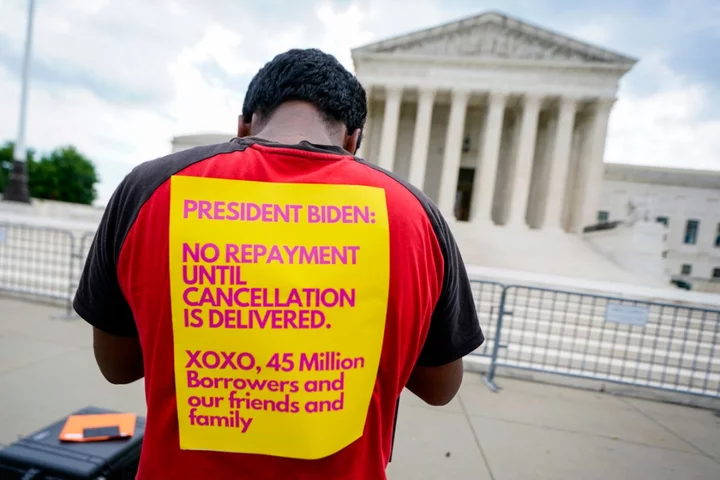
Supreme Court strikes down Biden’s plan to cancel student loan debts
The US Supreme Court has struck down President Joe Biden’s plan to cancel student loan debts for millions of Americans, reversing his campaign-trail promise as borrowers prepare to resume payments this summer. Chief Justice John Roberts delivered the 6-3 decision from the court’s conservative majority on 30 June. The ruling, which stems from a pair of cases challenging the Biden administration and the US Department of Education, argues that the president does not have the authority to implement sweeping relief, and that Congress never authorised the administration to do so. Within 30 minutes on the last day of its term, the court upended protections for LGBT+ people and blocked the president from a long-held promise to cancel student loan balances amid a ballooning debt crisis impacting millions of Americans. Under the plan unveiled last year, millions of people who took out federally backed student loans would be eligible for up to $20,000 in relief. Borrowers earning up to $125,000, or $250,000 for married couples, would be eligible for up to $10,000 of their federal student loans to be wiped out. Those borrowers would be eligible to receive up to $20,000 in relief if they received Pell grants. Roughly 43 million federal student loan borrowers would be eligible for that relief, including 20 million people who stand to have their debts canceled completely, according to the White House. Roughly 16 million already submitted their applications and received approval for debt cancellation last year, according to the Biden administration. The long-anticipated plan for debt cancellation was met almost immediately with litigation threats from conservative legal groups and Republican officials, arguing that the executive branch does not have authority to broadly cancel such debt. Six GOP-led states sued the Biden administration to stop the plan altogether, and a federal appeals court temporarily blocked any such relief as the legal challenges played out. Lawyers for the Biden administration contended that he has the authority to broadly cancel student loan debt under the Higher Education Relief Opportunities for Students Act of 2003, which allows the secretary of education to waive or modify loan provisions following a national emergency – in this case, Covid-19. Justice Roberts wrote that the law allows the secretary to “waive or modify” existing provisions for financial assistance, “not to rewrite that statute from the ground up.” The Supreme Court’s final decision of its 2022-2023 term also comes one day after another major education ruling, as the same conservative majority upended decades of precedent intended to promote racially diverse college campuses, what civil rights groups and the court’s liberal justices have derided as the court’s perversion of the 14th Amendment and the foundational concept of equal protection. Moments before its decision in the student debt plan, the Supreme Court decided a case involving a website designer who refused to cater to same-sex couples, but the case did not involve any such couple. Likewise, the case at the centre of the court’s decision on student loans involved an independent loan servicer in Missouri that did not want to be associated with the lawsuit. The six GOP-led states that led the challenge – Arkansas, Iowa, Kansas, Missouri, Nebraska, and South Carolina – opposed the Biden administration’s plan for a range of reasons that amount to “just general grievances; they do not show the particularized injury needed to bring suit,” Justice Elena Kagan wrote in her dissent. “And the States have no straightforward way of making that showing – of explaining how they are harmed by a plan that reduces individual borrowers’ federal student-loan debt,” she added. “So the States have thrown no fewer than four different theories of injury against the wall, hoping that a court anxious to get to the merits will say that one of them sticks.” She admonished a decision in which “the result here is that the Court substitutes itself for Congress and the Executive Branch in making national policy about student-loan forgiveness.” “The Court acts as though it is an arbiter of political and policy disputes, rather than of cases and controversies,” and by deciding the case, the court exceeds “the permissible boundaries of the judicial role,” Justice Kagan wrote. Since March 2020, with congressional passage of the Cares Act, monthly payments on student loan debt have been frozen with interest rates set at zero per cent. That Covid-19-pandemic era moratorium, first enacted under Donald Trump and extended several times, was paused a final time late last year – until the Education Department is allowed to cancel debts under the Biden plan, or until the litigation is resolved, but no later than 30 June. Payments would then resume 60 days later. The amount of debt taken out to support student loans for higher education costs has surged within the last decade, alongside growing tuition costs, increased private university enrollment, stagnant wages and GOP-led governments stripping investments in higher education and aid, putting the burden of college costs largely on students and their families. The crisis has exploded to a total balance of nearly $2 trillion, mostly wrapped up in federal loans. Millions of Americans also continue to tackle accrued interest without being able to chip away at their principal balances, even years after graduating, or have been forced to leave their colleges or universities without obtaining a degree at all while still facing loan repayments. Borrowers also have been trapped by predatory lending schemes with for-profit institutions and sky-high interest rates that have made it impossible for many borrowers to make any progress toward paying off their debt, with interest adding to balances that exceed the original loan. One analysis from the Education Department found that nearly 90 per cent of student loan relief would support people earning less than $75,000 per year. The median income of households with student loan balances is $76,400, while 7 per cent of borrowers are below the poverty line. That debt burden also falls disproportionately on Black borrowers and women. Black college graduates have an average of $52,000 in student loan debt and owe an average of $25,000 more than white graduates, according to the Education Data Initiative. Four years after graduating, Black student loan borrowers owe an average of 188 per cent more than white graduates. Women borrowers hold roughly two-thirds of all student loan debt, according to the American Association of University Women. Mr Biden’s announcement fulfilled a campaign-trail pledge to wipe out $10,000 in student loan debt per borrower if elected, though debt relief advocates and progressive lawmakers have urged him to cancel all debts and reject means-testing barriers in broad relief measures. In November 2020, the president called on Congress to “immediately” provide some relief for millions of borrowers saddled by growing debt. “[Student debt is] holding people up,” he said at the time. “They’re in real trouble. They’re having to make choices between paying their student loan and paying the rent.” ReNika Moore, director of the Racial Justice Program with the ACLU, among civil rights groups that filed briefs with the Supreme Court to defend the loan cancellation plan, said the “one-two punch” to end affirmative action and block debt relief will lock Americans out of economic oppurtunity and worsen wealth equality. “We urge the Biden administration and the Department of Education to move quickly to explore other pathways to ease the debt load on student loan borrowers once payments resume after a pandemic-related pause, including new executive action under the Higher Education Act, a law that allows for student loan relief for certain groups,” she added. Read More Supreme Court allows Colorado designer to deny LGBT+ customers in ruling on last day of Pride Month Biden condemns Supreme Court striking down affirmative action: ‘This is not a normal court’ Justice Ketanji Brown Jackson delivers searing civil rights lesson in dissent to affirmative action ruling The Supreme Court’s ruling on affirmative action is ugly and frustrating – but no surprise
2023-07-01 01:57
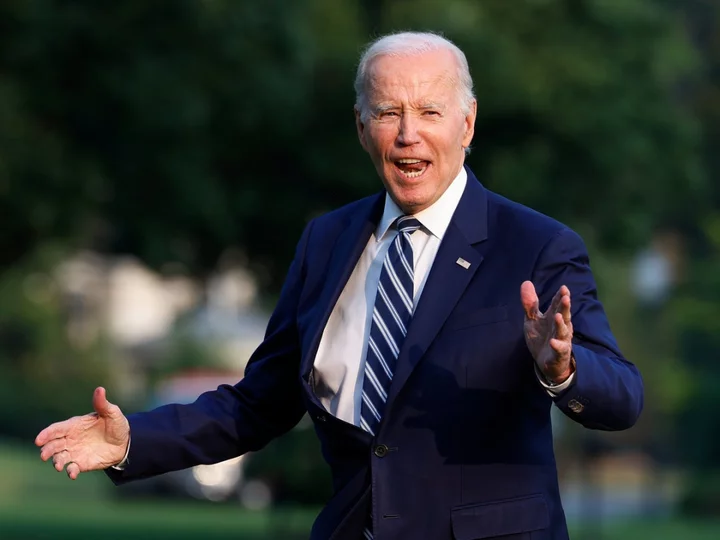
Biden says it would be ‘a mistake’ to expand Supreme Court – despite ruling on affirmative action
President Joe Biden has said it would be a mistake to expand the Supreme Court, despite its recent rulings against affirmative action in higher education, LGBT+ rights, and student loan debt forgiveness. The high court overturned decades of policies when it ruled this week that race-based admissions were not constitutional, preventing universities from considering race as a factor in student applications. Mr Biden hit out at the ruling on Thursday, commenting: “We cannot let this decision be the last word. “Discrimination still exists in America,” he added. “This is not a normal court.” Despite his strong reaction to the decision, the president ruled out the idea of “packing” the Supreme Court with additional justices in order to change the balance of opinion on the bench. “I think if we start the process of trying to expand the court, we’re going to politicise it maybe forever in a way that is not healthy,” Mr Biden told MSNBC’s Nicolle Wallace. It was a question Mr Biden was asked regularly during his last presidential campaign when a worried Democratic electorate expressed concern that there were few liberal justices left on the bench which would allow for the decisions handed down over the past year. Although it would not be unprecedented to change the number of justices in the Supreme Court — as the Constitution does not specify how many justices there should be — the number has remained at nine since not been changed since 1868. The court currently consists of nine justices — three of whom were chosen during Donald Trump’s only term as president, tipping the balance over to more conservative judges. Indeed, just three of the current nine justices were appointed by Democratic presidents — Justice Ketanji Brown Jackson was appointed by Mr Biden, and Elena Kagan and Sonia Sotomayor were appointed by President Barack Obama. Clarence Thomas was appointed by President George HW Bush, and President George W Bush appointed Samuel Alito and Chief Justice John Roberts. Since Mr Trump’s appointment of justices Neil Gorsuch, Brett Kavanaugh and Amy Coney Barrett, the court has weighed in with a conservative hand on landmark rulings — including the overturning of the historic abortion 1973 ruling Roe v. Wade, giving the decision on abortion provision over to individual states. In addition to the ruling on affirmative action, on Friday 30 June, the court also struck down President Biden’s plan to cancel student loan debts for millions of Americans, reversing his campaign-trail promise as borrowers prepare to resume payments this summer. The court also ruled that a wedding website designer may refuse to create work for people in the LGBT+ community if it conflicts with their religious beliefs. The case was unique in that it asked justices to rule on a question that was solely based on a hypothetical scenario. Read More Supreme Court allows Colorado designer to deny LGBT+ customers in ruling on last day of Pride Month Supreme Court strikes down Biden’s plan to cancel student loan debts The Supreme Court will decide if some judges have gone too far in striking down gun restrictions How the Supreme Court student loan decision affects you
2023-07-01 01:54

Senator who once worked at a Planned Parenthood warns that Republicans are planning a national abortion ban
When a draft of the Supreme Court’s Dobbs v Jackson opinion that would overturn Roe v Wade leaked in May of last year, US Senator Tina Smith had only three words. “This is bulls***,” the Minnesota Democrat tweeted. She had similar words when Walgreens announced in March of this year it would not dispense abortion pills in states where abortion remained legal. Ms Smith told The Independent in a phone interview that she knew the consequences of overturning the enshrined constitutional right to seek an abortion from her time working at Planned Parenthood as the Minnesota branch’s executive vice president for external affairs. She said her time working there taught her about the effects restrictions have on women’s lives. “The first thing I realized is that for women facing a decision about what to do about an unplanned pregnancy, a pregnancy that they don't want, this is a purely personal decision for them,” she said. “As a policymaker, why do Republicans in the Senate and in state legislators around the country think that they know better than those women whose stories they'll never know? Why do they think that they should be the ones who decide? It’s those women's decisions.” Ms Smith said that the Dobbs decision has led to rooting the question of abortion rights in terms of personal freedom. “You know, they can see this, these stories of individuals and doctors that are trying to provide the best health care, get the best health care for people, and you know, they unable to do that and they can see that that's just wrong,” she said. Sen Smith arrived under peculiar circumstances after then-Governor Mark Dayton nominated her, while she was serving as lieutenant governor of Minnesota, to replace Sen Al Franken amid multiple allegations of inappropriate sexual behaviour. Similarly, she has often been overshadowed by Minnesota’s senior Democratic Sen Amy Klobuchar, who ran for president. She and fellow midwestern Democratic Sen Tammy Baldwin, of Wisconsin, have a running joke that reporters and Capitol Hill staff often confuse them. In the past year, Sen Smith has emerged as a stronger presence. She wrote some of the climate provisions in what would become the Inflation Reduction Act. When Sen John Fetterman (D-PA) left the Senate for a few weeks to undergo treatment for depression, she spoke about her own difficulties with the condition. In addition, she’s emerged as one of the strongest voices defending abortion rights. Ms Smith said the Dobbs decision has made the contrast between Democrats and Republicans clearer. In recent months, Sen Tommy Tuberville (R-AL) has blocked military nominations because of the Pentagon’s policy that reimburses people who travel out of state to receive abortions. “What Senator Tuberville is doing is so outside the norms of what we should be doing in the Senate, it's outrageous,” she said. “I just need to point out that what Senator Tuberville is trying to do is to overturn a policy which basically provides women serving in the military with the same access to health care that people that are incarcerated in our federal prisons have.” Few Republicans seem deterred from their opposition to abortion despite the role it played in dulling their efforts to flip the Senate last year. Ms Smith’s colleague Sen Tim Scott (R-SC), now a candidate for president, told the Faith & Freedom Coalition’s Road to Majority Conference last month “thank God almighty for the Dobbs decision.” Former vice president Mike Pence has called for a 15-week national abortion ban. Meanwhile, former president Donald Trump has campaigned as the president who nominated the three Supreme Court justices who made the decision possible. Florida Gov Ron DeSantis, who often places a second distant behind Mr Trump in polls, signed legislation banning abortion after six weeks. As vice chairwoman of the Democratic Senatorial Campaign Committee, Ms Smith faces a tough challenge because not only does she have to defend Senate seats in Wisconsin, Michigan, Pennsylvania, Arizona and Nevada – all of which President Joe Biden won in 2020 – she also has to defend Senate seats in three states Mr Trump won twice: Ohio, Montana and West Virginia. “And make no mistake, if Republicans win the Senate or if Republicans win the White House, we can see from their statements, they're going to move to pass a national ban on abortion,” she said, noting how many GOP candidates for Senate oppose abortion. “So, this is the contrast, this is what voters will be confronted with when they cast their votes in 2024,” she said. “Do you want to elect individuals who think they know better, that they should be the ones making decisions, individuals that want to ban abortion rights? Or do you want to elect Democrats who believe that women and not politicians should be making their own health care decisions?” At the same time, Democrats face huge challenges to codify abortion rights. Last week, Mr Biden told donors he was personally uncomfortable with abortion. “I'm a practising Catholic,” he said on Tuesday. “I'm not big on abortion, but guess what? Roe v Wade got it right.” Sen Smith defended Mr Biden’s actions defending abortion rights. “I believe that the President and the administration have moved decisively in all the ways that they can as they look for other ways to the practical reproductive freedom, that's a good thing,” she said. “I'm proud of the work that they've done. I think ultimately, the action that we need to take is legislative action, and that is why we need to win these elections.” Last year, shortly after the Dobbs leak, Senate Majority Leader Chuck Schumer tried to put the Women’s Health Protection Act, which would have codified the protections in Roe, to a vote. But Sen Joe Manchin (D-WV) opposed the measure. Even then, Sen Kyrsten Sinema of Arizona, who later left the Democratic Party to become an independent, opposes removing the filibuster, which demands a two-thirds majority to pass legislation. Sen Smith said if Democrats with the House, the Senate and the White House again, they should get rid of the filibuster. “And you know, we need to work towards a Senate majority that will not only support reproductive freedom but will also change Senate rules so that we can act on that belief,” she said. “And that I think is going to as I said before, that I believe will be a decisive issue in the in the elections in 2024.” Read More Congresswoman who authored abortion rights bill calls Senate’s inaction to codify Roe v Wade ‘such a crime’ Ritchie Torres, the only openly gay Black man in Congress, on how he fights GOP ‘bullying’ of LGBT+ people Republicans try to thread the needle on abortion on anniversary of the death of Roe 'Rage giving' prompted by the end of Roe has dropped off, abortion access groups say Arizona executive order safeguards abortion seekers and providers from prosecution Why some doctors stay in US states with restrictive abortion laws and others leave
2023-07-01 01:54
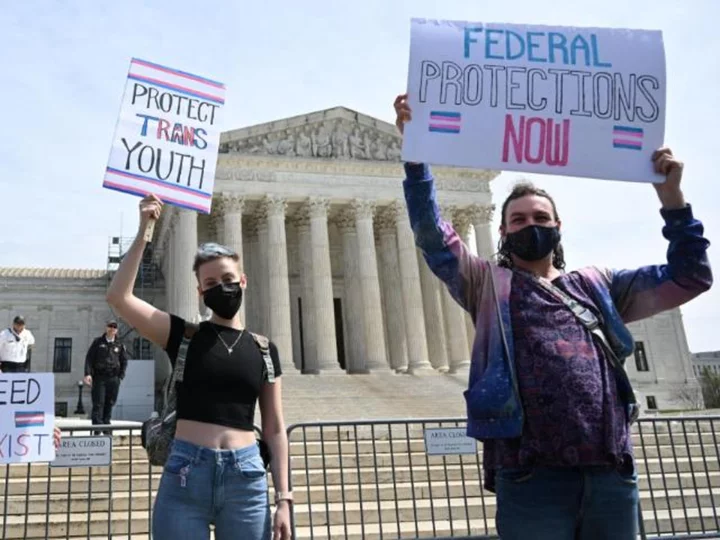
Supreme Court allows transgender woman's lawsuit against Virginia prison to continue
The Supreme Court on Friday cleared the way for an individual who suffers from gender dysphoria to sue a Virginia men's prison for violating a federal law that prohibits discrimination based on disability.
2023-07-01 01:29

New York official was bribed and let chicken contaminated with metal be served in school lunches, jury finds
A top official overseeing school lunches in New York City’s sprawling public school system took bribes and allowed dangerous chicken products contaminated with shards of metal and plastic to be served to children, a jury concluded on Wednesday. Eric Goldstein, who oversaw the city’s Office of Food and Nutrition Services, was convicted in a Brooklyn court of conspiracy, extortion, wire fraud, and taking bribes. Prosecutors said he was bribed with cash and an ownership stake in a food company by the owners of food supply company Somma – Blaine Iler, Michael Turley, Brian Twomey – in exchange for his cooperation facilitating lucrative contracts with the city. The trio of men were convicted of conspiracy, wire fraud, and bribery. “Eric Goldstein was for sale,” prosecutor Laura Zuckerwise said in her closing statemnets. “And Michael Turley, Blaine Iler and Brian Twomey, they bought him.” Goldstein could face up to 20 years in prison, according to The New York Post. The former school official, who previously started a food company of his own alongside Turley, Iler, and Twomey called Range Meats Supply, helped fast-track Somma to get contracts supply nearly 2,000 schools in 2015, leading to a huge spike in demand and millions of dollars of food orders. “I’m going to buy a lot of f***ing chicken from you guys, let’s do the beef,” Goldstein allegedly told Iler at a 2015 meeting, according to prosecutors. By September of 2016, people were complaining that Somma chicken contained pieces of wire-like metal and plastic, according to school incident logs shown to jurors. The chicken caused people to bleed and in one case choke on a bone in a supposedly boneless dish, according to officials. As complaints mounted, Turley, Iler, and Twomey allegedly offered Goldstein ownership of Range Meats and $66,000. The trio also sent money to Goldstein’s divorce lawyer and took the school official on trips around the world. The group used the code name “Roger Rabbit” to refer to Goldstein, according to law enforcement. During the trial, prosecutors showed jurors emails between the now-convicted conspirators, and showed photos of one of the tainted drumsticks, which had a bright red liquid oozing out of it. A lawyer for Goldstein told The New York Times has was “extremely disappointed” and would appeal the verdict.
2023-07-01 01:20
